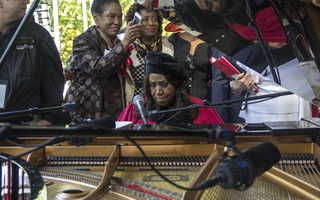Catherine T. Struve '92, who will attend Harvard Law next fall, already has a specific field in mind. "I'm hoping to work with rape and incest survivors. I see a real need for a lawyer who wants to work in that field, she says.
According to a 1986 ABA Journal survey, 22 percent of practicing attorneys pursued a legal career because "they wanted to see justice done." Twenty-three percent listed "a desire to change society" as a motive.
Many students also choose law schools because they find the work interesting and intellectually challenging.
"I think...over the last 50 years, it has been seen as an interesting and intellectually oriented work with the opportunity to make a good living," says James Vorenberg '49, former dean of Harvard Law School.
In addition, it's easy for students to pick law over other graduate fields; There are no undergraduate course requirements, and a degree is only three years of study away.
But for every law student interested in public service or intellectual stimulus, there's another in it for the big bucks.
The ABA Journal survey indicates that 46 percent of lawyers listed "income potential" as a primary reason for their career choice.
The promise of a high-paying job right after graduation can be tantalizing. The average starting salary for new graduates was $37,000 in 1988. In New York, some firms offer starting salaries as high as $76,000.
"[Law school] is an easy three years and boom--you have a job," says Lisa M. White '92, who is bound for Harvard Law School. "Money plays a lot into why people are going into law."
"I see myself being very tempted by money," she adds.
Although few deny that the big money is one of law school's primary magnets, some argue that students are less interested in the money itself than in the prestige or power that accompanies a high salary.
Richard D. Kahlenberg '85, author of the new book Broken Contract, argues that because law students are used to the distinction of academic success, high-paying jobs at large firms become their new measure of success.
High salaries are comparable to high grades, he argues, and "salary is a new merit badge."
Students recognize that the profession may have a bad image, but they say lawyers are usually respected, can exert power and often get rich.
Stanford law professor Robert Weisberg has a different take. he says students don't go to law school for its benefits--public service, money, prestige--but rather to avoid other, less attractive options.
Read more in News
CORRECTIONRecommended Articles
-
`L.A. Law': An HLS Corporate Fantasy"We don't have time to go around taking moral stands," the voice of Douglas Brackman, the balding managing partner of
-
Fighting the Just CauseI n Parliament, a South African minister of justice once called it "the single greatest force that perverts our legal
-
Fighting the Just CauseI n Parliament, a South African minister of justice once called it "the single greatest force that perverts our legal
-
Reno to Speak at Law School CommencementU.S. Attorney General Janet Reno will be the keynote speaker at the Law School's Commencement exercises, school officials said earlier
-
Fighting the Just CauseI n Parliament a South African minister of justice once called at "the Single greatest force that perverts our legal
-
 Bush, Bloomberg, and Others Awarded Honorary Degrees Thursday Morning
Bush, Bloomberg, and Others Awarded Honorary Degrees Thursday Morning













